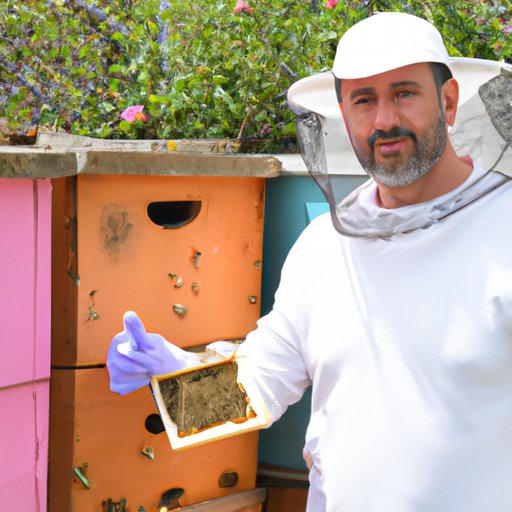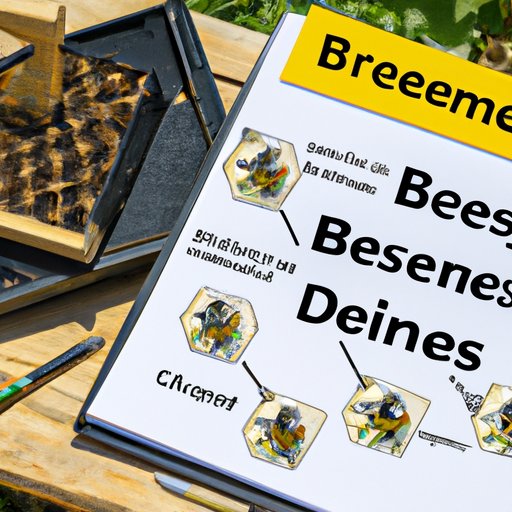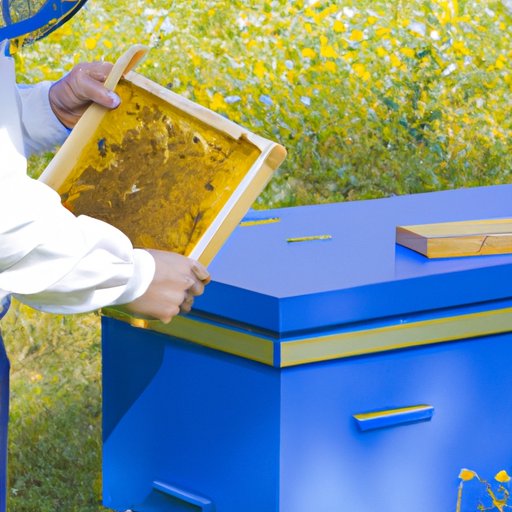Introduction
Beekeeping is the practice of managing honey bee colonies to produce honey and other bee-related products. It can be a rewarding and profitable venture, with bees producing honey, wax, propolis, royal jelly, and more. However, starting a beekeeping business requires a great deal of research and preparation. The following guide provides an overview of the essential steps for starting a successful beekeeping business.
Beekeeping Basics
Before beginning a beekeeping business, it’s important to understand the basics of beekeeping. There are many resources available to help you learn about beekeeping, including books, online courses, and local beekeeping clubs. It’s also a good idea to speak with experienced beekeepers to gain insight into the challenges and rewards of beekeeping.
There are a few essential pieces of equipment needed to get started, such as protective clothing, hive tools, and a smoker. You will also need to decide which types of bees to keep. The most common type is the European honey bee, but there are also many native species of bees that are well-suited for beekeeping. Additionally, you will need to understand the basic principles of hive maintenance and safety.

Financial Investment Needed to Start a Beekeeping Business
The cost of starting a beekeeping business varies depending on the size and scope of the operation. According to one study, the average start-up cost for a commercial beekeeping operation is between $2,000 and $5,000. This includes the cost of bees, hives, protective clothing, tools, and feed. Of course, larger operations may require a much bigger financial investment.
Fortunately, there are several sources of funding available to help cover the costs of starting a beekeeping business. Government grants, private loans, and crowdfunding campaigns are all potential sources of funding. Additionally, some states offer tax incentives or other assistance for beekeeping businesses.

Research Local Regulations and Licensing Requirements
Before beginning a beekeeping business, it’s important to understand the local regulations and licensing requirements. Each state has its own set of laws and regulations governing beekeeping. It’s important to familiarize yourself with these laws and obtain any necessary permits or licenses before beginning your business.
Additionally, it’s important to consider the legal implications of selling bee products. For example, if you plan to sell honey, you must ensure that it is labeled correctly and meets all applicable food safety standards. It’s also important to understand any liability issues related to beekeeping, such as potential stinging incidents.

Develop a Business Plan for Your Beekeeping Business
Creating a business plan is an essential step in starting a successful beekeeping business. The plan should include market research, pricing strategies, production plans, and other information. It’s important to understand the needs of your target market and develop a plan that meets those needs.
It’s also important to understand the competitive landscape and develop a pricing strategy that is competitive yet profitable. Additionally, it’s important to create a production plan that outlines how you will manage your bee colonies and produce bee products.
Identify Potential Markets and Customers for Your Bee Products
Once you have developed a business plan, it’s time to identify potential markets and customers for your bee products. Wholesale buyers, retail outlets, and online sales are all potential markets for bee products. It’s important to research the competition and determine the best way to reach your target market.
It’s also important to build relationships with potential customers. Networking with local beekeepers, farmers, and other industry professionals can help you find new customers and expand your business.
Conclusion
Starting a beekeeping business is an exciting venture, but it’s important to understand the basics of beekeeping and the financial investment required. Additionally, it’s important to research local regulations and licensing requirements and develop a business plan for your beekeeping business. Finally, identifying potential markets and customers for your bee products is essential for success. With the right knowledge, planning, and dedication, anyone can start a successful beekeeping business.
(Note: Is this article not meeting your expectations? Do you have knowledge or insights to share? Unlock new opportunities and expand your reach by joining our authors team. Click Registration to join us and share your expertise with our readers.)
